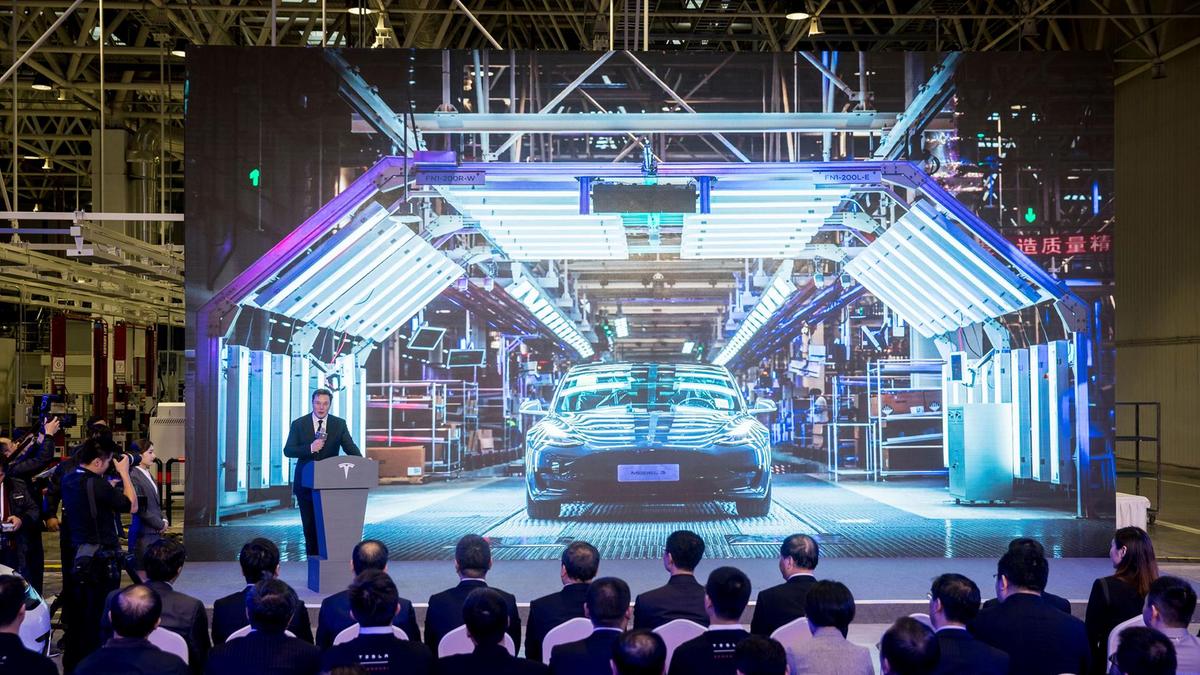Electric vehicle manufacturer Tesla delivered more cars than investors expected in the last quarter of 2019, raising its market capitalisation to more than $84 billion (Dh308.3bn) — around $2bn shy of the combined valuations of industry giants Ford and General Motors, which are currently valued at $36.8bn and $50.2bn, respectively.
 Billionaire Elon Musk, Tesla's chief executive, while speaking at a delivery ceremony for the first Model 3 sedans in Shanghai. AP
Billionaire Elon Musk, Tesla's chief executive, while speaking at a delivery ceremony for the first Model 3 sedans in Shanghai. AP California-headquartered Tesla delivered a record 112,000 vehicles in the last three months of 2019, bringing the total sold last year to 367,500 vehicles globally. By comparison, Ford sold more than 1.4 million vehicles in the first nine months of 2019, while General Motors sold 6.4 million.
Tesla has just begun production at a new facility in Shanghai — its first outside the US. Deliveries from the Shanghai plant to customers are taking place this month.
Tesla’s stock rose almost 3.9 per cent, zooming to a record $470 a share on Tuesday after its billionaire chief executive Elon Musk gave a presentation at the company’s Gigafactory in Shanghai. The company's shares have climbed more than 85 per cent since October last year, when they were trading at $254.
Tesla is expected to report an adjusted profit of $1.53 a share on sales of $6.9bn in the last quarter of 2019, according to analysts polled by FactSet, a Connecticut-based financial data and software company.
The company reported a profit of $1.93 a share on sales of $7.2bn in the last quarter of 2018.
Tesla is currently rolling off Model 3 sedans from the Shanghai plant. Success in boosting China sales could propel Tesla to as high as $500 a share, Morgan Stanley analyst Adam Jonas said in a December note.
The Shanghai plant, first unveiled in July 2018, is part of Tesla’s plans to strengthen its presence in the world’s largest EV market and lessen the impact of the US-China trade war. It currently produces about 1,000 cars a week, a figure it aims to double this year.
In November, Mr Musk predicted a weekly production of 3,000 EVs from the Shanghai plant at some point in the future.
The EV share of global car sales is forecast to rise to 2.5 per cent by 2020, from 1 per cent in 2017, according to the Bank of America Merrill Lynch, which predicts that EVs will constitute 90 per cent of sales by 2050.
However, global passenger EV sales fluctuated last year, reaching a high of 608,000 in the second quarter of 2019 before dropping to 480,000 units in the third quarter — down 8 per cent year-on-year, according to Hong Kong-based research firm Counterpoint.
Tesla led the EV market in the third quarter, taking 20 per cent of the global share, Counterpoint said.
It was followed by Chinese car makers BAIC Group at 10 per cent and BYD Auto at 9 per cent. German car-maker BMW had an 8 per cent share of the market.